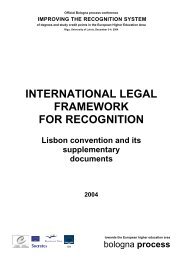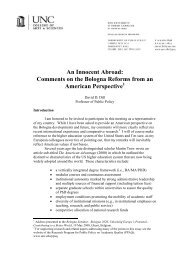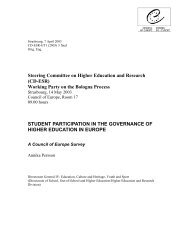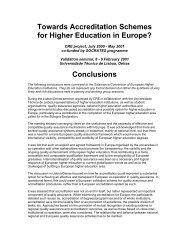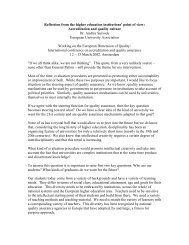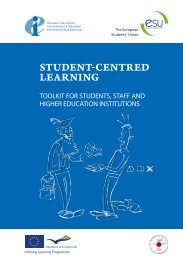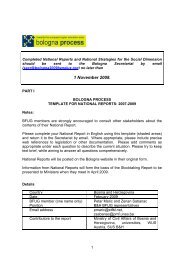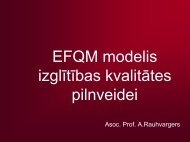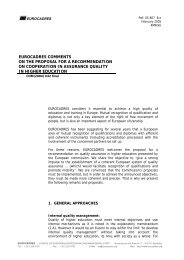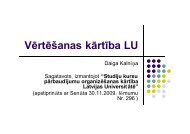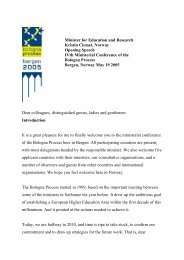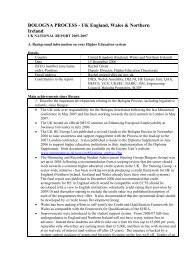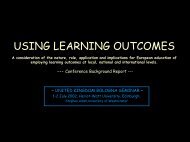1<strong>In</strong>troductionto the Bologna <strong>Master</strong>best model. Transnational joint degrees, part-time, e-learning, post-experience, distance andin-company modes, as well as accredited prior learning have become important features in theBologna <strong>Master</strong> landscape. So, too, has student mobility between disciplines, institutions, sectorsand countries.This profusion of modes and delivery patterns gives the <strong>Master</strong> a polymorphous character. It istherefore timely to attempt a mapping of its significance in 2009. But first, how has it come to bewhat it is now?The Bologna Process andthe Helsinki conference of 2003At their Berlin summit in 2003, the Bologna signatory ministers committed their governments tothe implementation of Bachelor and <strong>Master</strong> cycles by 2005. They noted that: ‘First and second cycledegrees should have different orientations and various profiles in order to accommodate a diversityof individual, academic and labour market needs. First cycle degrees should give access, in the senseof the Lisbon Recognition Convention, to second cycle programmes. Second cycle degrees shouldgive access to doctoral studies.’‘Access’ signifies ‘the right of qualified candidates to apply and to be considered for admission tohigher education’. That is to say, in respect of the <strong>Master</strong>, the right in principle to enter it from thelevel below, i.e. from the Bachelor or from its equivalent.The Berlin meeting implicitly reiterated the definition of the <strong>Master</strong> qualification which had beenrecommended a few months earlier by the Helsinki conference on <strong>Master</strong>-level degrees. This in turndrew on observations made by Tauch and Rauhvargers in 2002. They had presented evidence ofcontinuing structural diversity, as well as of a countervailing trend towards a common template,in which the <strong>Master</strong> qualification brought to its point of culmination a typical five-year sequenceof full-time studies carrying a total ECTS 300. This diversity within convergence led the Helsinkiconference to specify the <strong>Master</strong> as a band of credit values, within which a range of programmesmight be set:2. Students awarded a master degree must have achieved the level of knowledge andunderstanding, or high level in artistic competence when appropriate, which allows them tointegrate knowledge, and handle complexity, formulate judgements and communicate theirconclusions to an expert and to a non-expert audience. Students with a master degree willhave the learning skills needed to pursue further studies or research in a largely self-directed,autonomous manner.[…]4. Bachelor and master programmes should be described on the basis of content, qualityand learning outcomes, not only according to the duration of programmes or other formalcharacteristics.[…]7. While master degree programmes normally carry 90 - 120 ECTS credits, the minimumrequirements should amount to 60 ECTS credits at master level. As the length and the contentof bachelor degrees vary, there is a need to have similar flexibility at the master level. Creditsawarded should be of the appropriate profile.8. <strong>In</strong> certain fields, there may continue to exist integrated one-tier programmes leading to masterdegrees. Yet, opportunities for access to intermediate qualifications and transfer to otherprogrammes should be encouraged.14
9. Programmes leading to a master degree may have different orientations and various profilesin order to accommodate a diversity of individual, academic and labour market needs.<strong>Master</strong> degrees can be taken at universities and in some countries, in other higher educationinstitutions.The Dublin Descriptors<strong>In</strong> 2004, in the wake of Helsinki and Berlin, the Joint Quality <strong>In</strong>itiative developed criteria to determineat which point in their learning curve students might be judged to have attained a particular level.These level completion criteria, known as the Dublin Descriptors, specify the <strong>Master</strong> as follows:Qualifications that signify completion of the second cycle are awarded to students who:• have demonstrated knowledge and understanding that is founded upon and extends and/orenhances that typically associated with Bachelor’s level, and that provides a basis or opportunityfor originality in developing and/or applying ideas, often within a research context• can apply their knowledge and understanding, and problem solving abilities in new orunfamiliar environments within broader (or multidisciplinary) contexts related to their field ofstudy• have the ability to integrate knowledge and handle complexity, and formulate judgementswith incomplete or limited information, but that include reflecting on social and ethicalresponsibilities linked to the application of their knowledge and judgements• can communicate their conclusions, and the knowledge and rationale underpinning these, tospecialist and non-specialist audiences clearly and unambiguously• have the learning skills to allow them to continue to study in a manner that may be largely selfdirectedor autonomous.<strong>In</strong> Bergen in 2005, ministers invoked these descriptors when they adopted ‘the overarchingframework for qualifications in the EHEA, comprising three cycles (including, within nationalcontexts, the possibility of intermediate qualifications), generic descriptors for each cycle based onlearning outcomes and competences, and credit ranges in the first and second cycles’. Two yearslater, in London, they insisted on the use of learning outcomes in curriculum design and studentcentredpedagogy.The conceptual apparatus evolved in the early years of the Bologna Process supports the architectureof qualifications in which the <strong>Master</strong> finds its place. The concepts and the framework are nowwidely accepted. This report will show that, notwithstanding these achievements, transparency andreadability have not yet been fully realised.15



